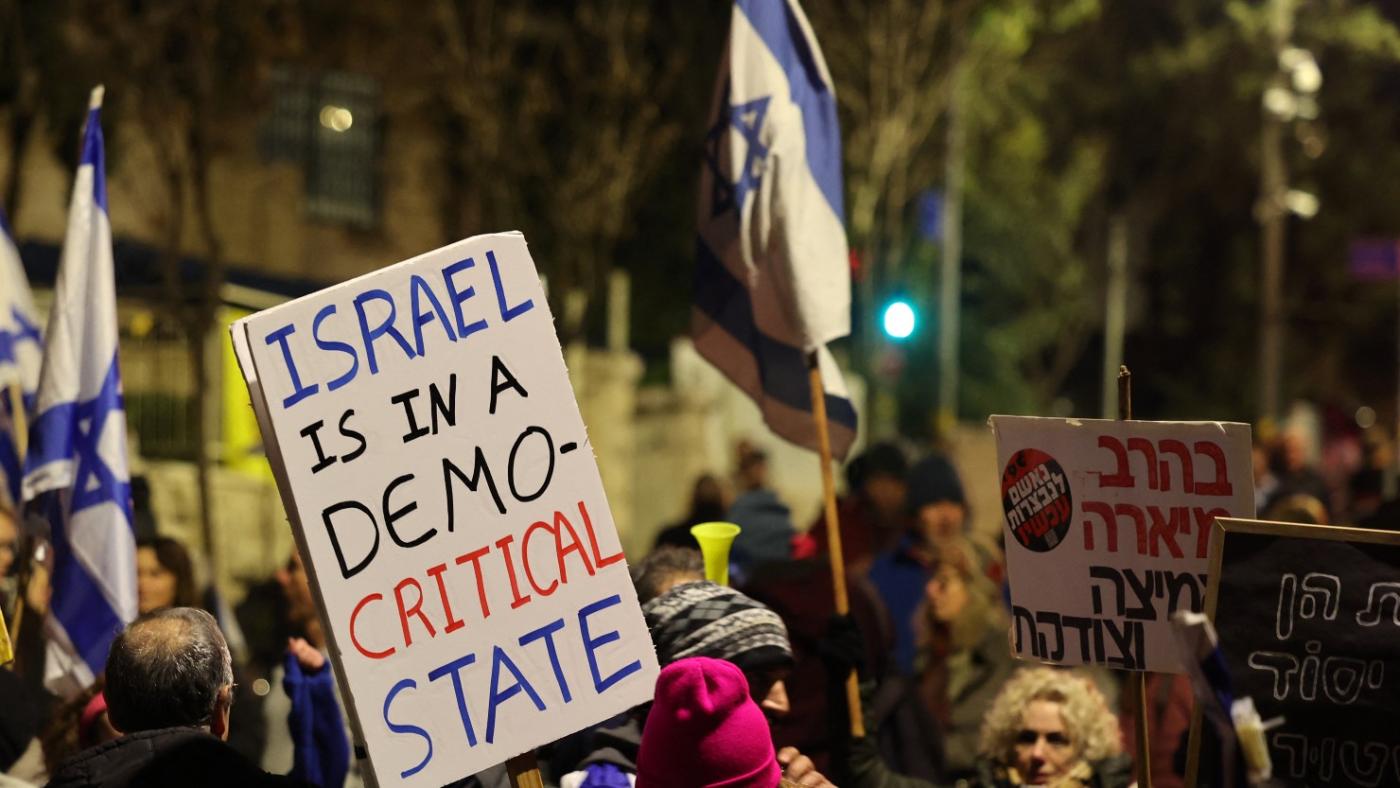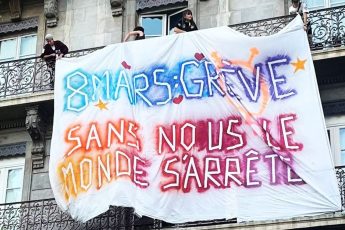
by TSS Platform
After unprecedented protests across Israel, Benjamin Netanyahu froze for a month the approval process of the justice reform sought by his government. Netanyahu has been forced to halt the process by the uprisings and the general strike, but the far-right within his government has gained the promise to constitute a new “national guard” under its control. The situation is by no means resolved, and a month from now the situation is likely to be in exactly the same terms. Yesterday we spoke with Uri, an Israeli-born radical activist currently residing in the UK who is closely following the developments. We posed some questions to better understand what is moving inside the mass demonstrations that have taken place in these weeks, if this movement signals a political transformation in Israeli society, if and to what extent it is a sign of a contestation also of military repression and political apartheid suffered by Palestinians, and how the political situation in Israel is affected by wider dynamics, including the global turmoil fuelled by the war in Ukraine. The use of the reference to democracy to protest against an elected government that is in fact respecting formal democratic rules, something we are seeing also in France with the movement against Macron’s retirement reform and the use of article 49.3, is certainly interesting. The question, then, is whether, as a result of these mass protests, democracy can become something more substantial than the political procedure for authorizing neoliberal policies, the repression of Palestinians, and the consolidation of an ethnic theocratic state.
TSS: The protest in Israel has reached a level not seen before, can you give us a brief update on the situation in this moment?
URI: As I write there are mass demonstrations taking place in Tel Aviv and in Jerusalem. A general strike has been announced by the country’s largest labour union. High schools and universities have closed, as has the country’s main international airport. Numerous private companies have also suspended operations, and the lawyers’ guild has called on its members not to appear in court. There are indications that prime minister Netanyahu will freeze the proposed legislation intended to weaken the Supreme Court until the next parliamentary session, but this has not been confirmed yet [in the meanwhile, this has happened as we wrote in the introduction]. Meanwhile there is also a right-wing demonstration being organised in support of laws. It is an unprecedented political crisis in Israeli history, although of course it showcases all the deep faults in the society.
We see a huge presence of Israeli flags in the demonstrations, under the idea of defending democracy people and groups from right to left are taking part in the protest. However, we can imagine that they have also different claims and ways of understanding what they are defending. Can you give us some more information on the composition of the protest?
The protesters are largely from the middle classes, and have a liberal-centrist orientation aligned with the mainstream Zionist parties. A call for action from two weeks ago had the following signatories: ‘Commanders for Israel’s Security’, ‘The Hi-Tech Workers’ Protest’, ‘White Coats (Doctors’ Protest)’, ‘Students’ Protest’, ‘Democracy Social Workers’, ‘Academia Struggle Headquarters’, ‘Accountants for Democracy’, ‘The Cloaks’ Struggle’ (lawyers), ‘The Association for the LGBTQ’, ‘LGBTech’, ‘Artillery Veterans for Democracy’, ‘Armored Corps Veterans for the Defense of Democracy’, ‘555 Patriots’, ‘Naval Officers Protecting Democracy’, ‘Submarine Fighters Protecting Democracy’, ‘Education Workers’ Struggle’, ‘Together with the Fighters of Kippur 1973’, ‘669 Reservists’, ‘Pride Headquarters Against the Enablement Clause’, ‘Planners, Architects and Engineers for Democracy’, ‘No democracy, no culture’, ‘The Cultural World for Democracy’, ‘No education without Democracy’, ‘The Youth’s Struggle for Democracy’, ‘The Democrats’, ‘Kahanism, Racism and Homophobia – Not in Our School’, ‘School Principals’ Forum for Human Rights’, ‘The Black Flags – Save Democracy’ (anti-corruption group, not anarchists), ‘From Protest to Resistance’, ‘Crime Minister’, ‘Koomi Israel’, ‘The Pink Front’, ‘Democracy Now’, ‘Israeli Landslide’, ‘The Civil Democratic Movement’, ‘Civilian Call-up Order’, ‘No Way’, ‘The Fighters’ Demonstrations Hotline’, ‘The People’s Protest Haifa’, ‘Mothers against violence’, ‘Strengthening’, ‘110 intersections, bridges and squares throughout the country’, ‘Musicians for Democracy’, ‘Justice and Democracy Fighters’, ‘The Women’s Struggle – Building an Alternative’.
As you can see there are a lot of military reservists involved, as well as organised groups from various professions, and overall these protests represent the mainstream secular Zionist point of view adhering to the concept of a “Jewish and Democratic” state. That said, there has also been participation by radical left groups who organised an “anti-occupation bloc” in the main demos. These activists have been gaining increasing acceptance at the protests after initially being marginalised and sometimes even attacked. But apart from these, the protests are not all that heterogenous in their message. They basically represent a resistance to the brazen Jewish supremacism and neoliberal extremism of the current government, but without really seeing through the nature of the regime between the river and the sea.
Here’s a translated passage from an article published by critical Israeli columnist Meron Rapoport:
“This is what was behind the vindictive ambition of the current coalition and behind [Justice Minister Yariv] Levin’s reform: an attempt to ensure that what happened in the four election systems from 2019 to 2022 will not be repeated. To ensure the rule of the Right and allow it to realize its agendas: from the institutionalization of apartheid in the territories, through the removal of Arab parties from the parliament in Israel, to the crushing of the secular-liberal centres of power in Jewish society. This can only be done by sterilizing the Supreme Court. In other words, the right wing coalition decided to officially place “Jewish” above “democratic”…From this emerged the feeling of so many Israeli-Jews that the danger of a dictatorship threatens them (the Palestinians are already used to the denial of rights, so they were less excited), from this emerged the adherence to the slogan “democracy”…What gave rise to the huge spontaneous protest yesterday was the dismissal of Defence Minister Yoav Galant, because he was perceived as loyal to the military elite, which strongly opposed the reform, and was accused of protecting the thousands – pilots and others – who announced that they ‘will not serve under the dictatorship'”.
How is the economic situation having an impact in the protests?
There is a cost of living crisis in Israel, and this contributes to the protesters’ sense that the government is neglecting the “real issues that bother citizens” in pursuit of their regime change agenda, as well as the perception among the mainstream protesters that the government is serving particular sectoral interests (settlers, ultra-orthodox) who are painted as “not contributing to the country”, particularly the ultra-orthodox who do not serve in the military and are not “productive” in terms of the neoliberal common sense.
We have seen Arab Israeli both taking part in the protests and remaining somehow cold towards the idea of defending Israeli democracy. Can you tell us something about how protests are reflecting tensions within Israeli society?
Again, this is a protest movement of the mainstream secular-Jewish middle class. This “democracy” which they are defending has always been something closer to an ethnocracy, and Palestinian citizens of Israel have less of a stake in it because it’s basically defending a status quo under which they were already marginalised. Another aspect here is the intra-Jewish ethnic/class division, between those of European ancestry (Ashkenazim) – associated with the center and the middle class – and those whose heritage is in the Arab and Muslim world (Mizrachim) – associated with the right and the working class. This is not a hard and fast division, but certainly you hear a lot of voices on the right who represent Netanyahu and the current government as the heroes of the marginalized Mizrachim, and institutions like the Supreme Court and the elite military units as a bastion of Ashkenazi hegemony (which is true, up to a point, but is basically similar to the class and urban-rural divisions that have driven the ascendancy of politicians like Orban or Trump who rally against “the elite”).
Do you think this movement is opening up a space to contest Israeli policies, including apartheid and occupation, or is rather reinforcing the idea that democracy can go together with them?
It’s hard to be optimistic in this respect. Yes, there have been calls for giving Israel a Constitution that will anchor equality and liberal values, but whether these protests actually lead to a reconsideration of what “democracy” is and for whom is an open question. Again, I find Rapoport’s analysis helpful here:
“One possibility, quite likely, is a return to the original positions: that is, the pilots will return to bombing Gaza or anywhere else the government instructs them, the holders of economic privileges will return to their positions in the neoliberal system, and the Supreme Court will continue not to represent the population in Israel: Arabs, Mizrahim, Ethiopians and others. But there is certainly another possibility. The feeling is – perhaps the hope is – that the hundreds of thousands who took to the streets learned a new language. They are not ready to return to the starting positions of January 3, 2023, the day before Levin announced the reform. For three months they shouted “democracy or rebellion”, and now there is a possibility that they will start taking the term “democracy” seriously. They can, perhaps, be the agents of a much more real democratization within Israel. The requirements for the constitution or fundamental laws of significance can certainly be used as a basis.” Rapoport’s optimism is a bit forced, to be sure, but another aspect that should be emphasised is that the protests have suddenly legitimated things like calls for military refusal, and the notion that if the legislation is passed Israeli leaders will be more exposed to sanctions abroad. These things may have wider consequences that we will witness in the coming months.
How has the war in Ukraine and its consequences on the economy and international alignments influenced the economic, social and political situation in Israel? Do you see any relation between the new global scenario and the fact that this revolt is happening now?
This is a bit too complicated to answer in brief, but yes, it seems to me that Netanyahu’s overall move in the past years has been to re-orient Israel towards the right-populist axis that has included both Trump and Putin, as well as Orban and Modi in India; in this sense, the protests in Israel signal that this axis is now on the retreat. But I’m hesitant to make more sweeping claims in this regard.
In the very same weeks when the protest in Israel was growing, we have seen a large mobilization rising in France against Macron’s government. Do you see any parallel between these two situations?
I don’t know enough about the situation in France to responsibly comment on this. Perhaps what the two movements have in common is the sense that the government is ramming through major changes in a high-handed manner – in a way it reminds me of the reaction to Trump’s executive orders when he entered office. It’s a reaction to authoritative overreach – but it’s a bit like getting all active about climate change only once the tornadoes are hitting and the sea is breaching inland.





